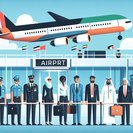
Low-cost carrier Air Arabia Abu Dhabi operated its inaugural Abu Dhabi–Damascus service on 28 October, restoring a direct commercial link that had been absent from the UAE capital since 2011. The thrice-weekly A320 flight departs Zayed International Airport every Tuesday, Thursday and Saturday, complementing the airline’s existing Sharjah–Damascus route.
The move is strategically significant: it gives Syrian diaspora residents in the UAE a non-stop option that avoids transiting through third countries and provides price competition against full-service rivals operating via Beirut or Amman. For corporates, the new sector cuts door-to-door journey times for construction, energy and NGO staff involved in Syria’s early-stage reconstruction projects.
Air Arabia Group CEO Adel Al Ali said the launch demonstrates the carrier’s “continued network-expansion strategy” and its commitment to offering affordable connectivity across the Levant. Early bookings show strong demand—seat-load factors above 85 percent for the first month—despite ongoing Western sanctions on parts of the Syrian economy.
Practical implications: UAE companies sending staff to Syria should update their travel-risk assessments; insurance underwriters still classify Damascus as a high-risk destination, so war-risk surcharges may apply. Travellers must also ensure Syrian visas or security clearances are arranged in advance, as Damascus Airport does not yet issue visas on arrival for most nationalities.
Air Arabia Abu Dhabi now serves more than 30 destinations with a fleet of 12 Airbus A320s. The Damascus addition is expected to boost bilateral tourism and facilitate family reunions for the estimated 140 000 Syrians living in the capital region.
The move is strategically significant: it gives Syrian diaspora residents in the UAE a non-stop option that avoids transiting through third countries and provides price competition against full-service rivals operating via Beirut or Amman. For corporates, the new sector cuts door-to-door journey times for construction, energy and NGO staff involved in Syria’s early-stage reconstruction projects.
Air Arabia Group CEO Adel Al Ali said the launch demonstrates the carrier’s “continued network-expansion strategy” and its commitment to offering affordable connectivity across the Levant. Early bookings show strong demand—seat-load factors above 85 percent for the first month—despite ongoing Western sanctions on parts of the Syrian economy.
Practical implications: UAE companies sending staff to Syria should update their travel-risk assessments; insurance underwriters still classify Damascus as a high-risk destination, so war-risk surcharges may apply. Travellers must also ensure Syrian visas or security clearances are arranged in advance, as Damascus Airport does not yet issue visas on arrival for most nationalities.
Air Arabia Abu Dhabi now serves more than 30 destinations with a fleet of 12 Airbus A320s. The Damascus addition is expected to boost bilateral tourism and facilitate family reunions for the estimated 140 000 Syrians living in the capital region.





